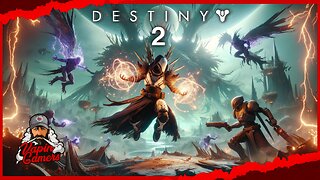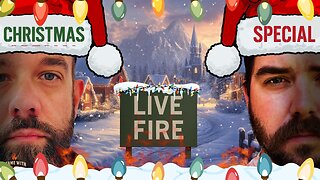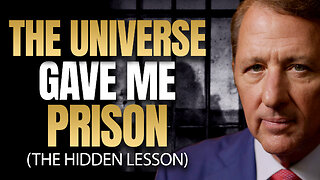Premium Only Content

BEFORE WE GET CLOSE
A new manuscript for a generation untrained in love.
⸻
We don’t know how to do this.
Not really.
We’ve read the takes, heard the podcasts, swiped the apps.
We’ve watched the worst-case scenarios on TikTok
and called them cautionary tales.
But when it comes time to actually sit across from someone—
someone real—
most of us glitch.
We either perform
or retreat.
Control
or collapse.
Because getting close now feels less like warmth,
and more like risk management.
⸻
You’ll notice it early—
on the first date, the first text,
the first moment someone says something a little too honest.
Watch what happens.
The impulse will be to self-protect.
To make a joke. To pivot.
To ask a question you don’t really care about.
To keep it light—
because God forbid something means something.
But here’s the problem:
We want meaning.
We just want to receive it without the weight of vulnerability.
We want connection
without the cost of exposure.
And that doesn’t exist.
⸻
The modern dating scene is a brilliantly constructed emotional loophole—
it offers you infinite options,
so you never have to invest in one.
You get the illusion of intimacy
without the discomfort of actual contact.
You can play at love
while remaining entirely defended.
And we do.
All of us.
Even the ones who say they’re “ready.”
Because being ready isn’t about wanting a relationship.
It’s about being willing to be seen in one.
And most of us haven’t practiced that in years.
⸻
So before we talk about commitment,
Before we ask what men want,
Or what women need,
Or who ghosted who,
Or what “the masculine” or “the feminine” is supposed to be…
We have to ask:
Do we even know how to sit in front of someone and tell the truth—without flinching?
Do we know how to say:
“I want to be close, but I’m scared.”
“I push people away because I was dropped.”
“I pretend I don’t need anything, but that’s a lie.”
“I don’t know how to trust what I haven’t had yet.”
“I want this. And I want to stay.”
Not in theory.
Not in tweets.
Not in clever captions.
In the room.
In the quiet.
With no script.
⸻
Because if we don’t start there,
then everything that follows—
the polarity, the “standards,” the icks, the chemistry—
it’s all noise.
Attraction can happen without safety.
But connection?
That requires surrender.
And no one’s teaching that.
Not well.
Not honestly.
So we’re writing this now—
not as a guide.
Not as a gospel.
Just a place to start.
Not with seduction.
Not with strategy.
Just a simple question, asked face to face:
“Can I stop pretending now?”
⸻
AFTER YOU STAY
What to do when love stops feeling like magic, and starts feeling like life.
⸻
Chapter One: The Myth of Constant Spark
No one tells you that after you get what you wanted—
you might still feel restless.
That after someone chooses you,
you might start looking for reasons they shouldn’t have.
That even when it’s healthy,
something in you will look for the high you used to get from chaos.
Because many of us confuse intensity with intimacy.
Drama with depth.
Uncertainty with attraction.
And when those things are gone—
when it’s safe, quiet, and mutual—
the silence can feel like a loss.
⸻
But it’s not a loss.
It’s just what peace sounds like
when you’ve never known it before.
⸻
This is the part no one writes songs about.
Not because it’s boring,
but because it’s harder to market:
The part where love becomes
repetition,
choice,
repair,
space,
and small, unnoticed acts
that never trend.
The text that says, “I’m on my way home.”
The coffee placed where you like it.
The deep breath before reacting.
The decision to stay in the room.
⸻
This isn’t the spark.
This is the hearth.
It won’t dazzle you.
It will warm you.
But only if you tend it.
⸻
Closing prompt:
What if the quiet you’re questioning… is actually the love you said you wanted?
⸻
AFTER YOU STAY
Chapter Two: What Closeness Exposes
Getting close sounds beautiful until you realize:
closeness is not soft lighting and forehead kisses.
It’s a mirror.
And it doesn’t just reflect who they are.
It reflects who you are under pressure,
in boredom,
when you’re tired,
or scared,
or unappreciated.
Closeness doesn’t just expose them.
It exposes you.
The parts of you that criticize too quickly.
Or shut down when you feel misunderstood.
The part of you that wants to punish, not repair.
The part that wants to win, not connect.
You’ll see all of it.
And so will they.
⸻
At first, it’ll be tempting to blame them for what they expose.
“You make me feel small.”
“You bring out the worst in me.”
“You never let me relax.”
But the truth is—
they didn’t cause the wound.
They just got close enough to touch it.
And touching it doesn’t mean it’s unsafe.
It means it’s real.
⸻
If you stay,
you will be seen.
And being seen is beautiful—
but also terrifying
when you’ve spent most of your life performing.
So don’t panic.
And don’t run.
Just pause long enough to notice:
this isn’t damage.
It’s the beginning of intimacy.
⸻
Closing prompt:
What part of you shows up when you’re seen without your mask on?
And do you let that part be loved, too?
⸻
AFTER YOU STAY
Chapter Three: Wanting Out Isn’t Always a Sign to Go
You will feel it.
Even in the good ones.
Especially in the real ones.
The tug.
The voice.
The itch that says:
“Maybe I made a mistake.”
“Maybe there’s someone better.”
“Maybe I’m losing myself.”
This is the part where many leave.
But here’s the secret:
The urge to leave isn’t always about them.
It’s about what closeness activates in you.
⸻
Real intimacy doesn’t just hold you.
It corners you.
It pushes you up against your old escape routes:
the detachment you used to rely on,
the independence you wore like armor,
the fantasy of someone “perfect” who would never trigger you.
When love becomes consistent,
your nervous system—conditioned by absence, chaos, or control—may interpret it as boredom, or threat.
You’ll start craving the old patterns.
The push and pull.
The drama that felt like meaning.
The validation that had to be earned.
But none of that was love.
It was survival.
⸻
So when you feel the pull to disappear,
ask:
Am I in danger?
Or am I just unfamiliar with safety?
Do I need to leave?
Or do I need to let go—of who I used to be,
and how I used to run?
Because sometimes leaving is wisdom.
And sometimes it’s habit.
⸻
Closing prompt:
What part of you wants to leave?
And what would happen if you stayed long enough to listen instead?
⸻
AFTER YOU STAY
Chapter Four: How to Repair Without Resentment
Conflict is not the problem.
Avoidance is.
So is scorekeeping.
So is pretending everything’s fine while resentment grows roots.
If you’re going to stay,
you’re going to fight.
But staying well means learning how to repair—
not just make up, not just move on—
repair.
Because love isn’t what happens in the good moments.
It’s what happens after the rupture.
⸻
Here’s what doesn’t work:
• Letting hours pass in silence and calling it “space.”
• Apologizing just to end the tension.
• Withholding affection as punishment.
• Talking like lawyers instead of lovers.
• Expecting the other person to just “know.”
Here’s what does:
• Saying, “I felt hurt. I want to understand what happened.”
• Asking, “What did that bring up for you?”
• Naming your defensiveness before it takes the mic.
• Dropping the need to win.
⸻
There is no repair without humility.
And no relationship survives without repair.
The rupture will happen.
The choice is:
do we meet each other in the wreckage—
or do we both walk away feeling slightly right and entirely alone?
⸻
This isn’t about fixing fast.
It’s about staying soft enough
to let healing happen slowly.
Not to get back to “normal,”
but to build something better than before.
⸻
Closing prompt:
When things break, do you reach for control, distance, or understanding?
And which one actually brings you closer?
⸻
AFTER YOU STAY
Chapter Five: The Boring, Beautiful Stuff That Actually Builds Love
No one tells you that a good relationship eventually starts to look like…
a routine.
Not a rut.
A rhythm.
The same kitchen.
The same couch.
The same person brushing their teeth beside you again.
There will be moments you mistake this for monotony.
You’ll wonder:
“Shouldn’t this feel more exciting?”
“Have we lost something?”
But that quiet you’re questioning—
it’s not the absence of love.
It’s what love looks like once it’s safe enough to stop performing.
⸻
Here’s what real building looks like:
• Asking what they want from the grocery store and remembering it next time.
• Sitting beside each other in silence without needing to fill it.
• Checking in midweek just because.
• Folding the towel the way they like, not because it matters to you—
but because it matters to them.
• Laughing at something small and stupid.
• Seeing their worst day and not turning away.
• Saying, “I’m here,” again and again,
even when you don’t feel particularly poetic about it.
⸻
Love isn’t made in grand gestures.
It’s made in small decisions, repeated.
It’s easy to fall in love.
It’s harder to keep choosing someone after the novelty fades
and the dishes keep piling up.
But if you stay long enough—
you’ll find a quiet joy hidden inside the repetition.
Something solid.
Something sacred.
Not intensity.
But intimacy.
Not a spark.
But a steady, human flame.
⸻
Closing prompt:
Are you chasing chemistry because it’s missing—
or because you’ve never let consistency feel like enough?
⸻
AFTER YOU STAY
Chapter Six: You Can Miss Your Old Life and Still Want This One
No one warns you about this feeling.
The quiet ache—not for someone else,
but for the version of you that was free.
Not better.
Just lighter.
The freedom to leave the house without explaining where you’re going.
The late nights alone with no emotional consequences.
The silence.
The solitude.
The possibility of who else you might have become.
You don’t miss being single.
You miss the idea of what could’ve been.
And sometimes that can feel like betrayal.
⸻
But it isn’t betrayal.
It’s grief.
Even when you choose love,
you give something up.
A path you didn’t take.
An identity that no longer fits.
And grief doesn’t mean regret.
⸻
You’re allowed to miss the past
and still choose the present.
You’re allowed to feel the friction between where you were and where you are
without making one of them wrong.
This isn’t a sign you’re in the wrong relationship.
It’s a sign you’re a whole person—with memory, complexity, and agency.
⸻
Real commitment makes room for contradiction.
The life you left behind still echoes, sometimes.
It whispers.
But if you stop running from that voice—
and just sit with it—
you’ll often find it isn’t asking you to go back.
It’s asking you to bring more of yourself forward.
⸻
Closing prompt:
What part of your old life do you miss—
and is it something you truly want back,
or something you’re afraid of losing within yourself?
⸻
AFTER YOU STAY
Chapter Seven: Sex After the Rush
At first, it was effortless.
Touch didn’t require scheduling.
Desire was ambient—buzzing in the background
like a hum you didn’t notice until it stopped.
But eventually, it did.
Not completely.
Just… enough to feel like something was missing.
Not broken.
Just different.
This is the part no one wants to talk about.
Because sex is supposed to be spontaneous.
Effortless.
Constant.
Right?
⸻
But long-term intimacy is not a porn loop.
It’s a practice.
And what it reveals over time
has less to do with chemistry
and more to do with honesty.
Sex after the rush means…
• Being willing to initiate when you don’t feel like the hottest version of yourself.
• Staying present when your mind is noisy.
• Finding new ways to meet each other, not just physically, but emotionally.
• Letting go of the pressure to perform and choosing presence instead.
⸻
Desire doesn’t die.
But it does change shape.
It no longer runs on novelty.
It runs on nourishment.
Safety.
Curiosity.
Shared attention.
And the choice to keep seeing each other—
even when you already know what’s underneath the clothes.
⸻
There will be stretches.
Longer than you’d like.
Where sex feels like something you used to do
when life was lighter,
and bodies felt less tired,
and connection was easier to reach.
That’s normal.
It’s not a failure.
It’s not the end.
It’s just a cue:
return to touch.
To the body.
To the moment—
even if the moment isn’t particularly cinematic.
⸻
Because what matters most is not how often.
It’s how honest.
How open.
How present.
How safe.
Because when the body feels safe—
desire often returns on its own.
Quietly.
And with it, a new kind of fire.
⸻
Closing prompt:
Are you judging your sex life by someone else’s highlight reel—
or by your own truth, timing, and trust?
⸻
AFTER YOU STAY
Chapter Eight: Choosing Again, When You’re Not in the Mood
There will be days—
maybe weeks—
where love doesn’t feel like a feeling.
You won’t be mad.
You won’t be swept up in passion.
You’ll just… feel flat.
Tired. Distracted. Busy.
Focused on your to-do list.
Pulled by your phone.
Preoccupied with your own mental weather.
And in those moments,
you might glance at them and think,
“I know I love you,
but I don’t feel it right now.”
⸻
Here’s the secret:
That’s not a red flag. That’s reality.
Even the best relationships go quiet.
Not broken.
Not distant.
Just… backgrounded.
Because love isn’t always loud.
And sometimes life needs your attention more than romance does.
⸻
But here’s where the practice comes in:
You still choose.
You choose to lean in,
even when it would be easier to emotionally coast.
You choose to check in,
even if they didn’t ask for it.
You choose to say “I love you,”
even when it doesn’t feel poetic.
You choose to be kind,
even if your mood doesn’t vote for it.
Because love isn’t what you feel every day.
It’s what you do every day—
especially when you’re not in the mood.
⸻
This is what long-term connection asks of you:
Not performance.
Not perfection.
But participation.
Especially in the quiet seasons.
Especially when the butterflies are on break.
Especially when the old rush isn’t rushing in.
⸻
If you wait until you feel like loving,
you’ll spend most of your life waiting.
But if you remember that love is a verb—
then even small gestures
become sacred.
And momentum returns.
⸻
Closing prompt:
When love goes quiet in you—do you withdraw, perform, or choose again?
⸻
AFTER YOU STAY
Chapter Nine: Love Is a Skillset, Not a Spell
We were sold the myth of effortless love.
That the right person would just “get” you.
That the chemistry would carry the connection.
That if it was meant to be, it wouldn’t be this hard.
But here’s the truth:
Even soulmates need tools.
⸻
Loving well requires skills.
And most of us were never taught them.
Not by our parents.
Not by the culture.
Not by our own trial and error.
So we enter relationships fluent in performance,
but illiterate in repair.
Fluent in attraction,
but clumsy with communication.
Fluent in fantasy,
but underprepared for maintenance.
⸻
These are the actual skills of loving well:
• Knowing how to regulate your own emotions before you project them.
• Listening without forming a counterpoint.
• Naming what you need without turning it into a demand.
• Letting your partner be different than you imagined, and loving them anyway.
• Repairing ruptures without waiting to be begged.
• Receiving care without suspicion.
• Staying kind when you’re tired.
• Knowing how to be alone without disconnecting.
⸻
These skills don’t arrive with infatuation.
They emerge in practice.
In failure.
In apology.
In time.
And the couples who last?
They aren’t the luckiest.
They’re the ones who stayed in the room long enough to learn how.
⸻
Yes, chemistry matters.
But chemistry is just an opening.
What follows is craftsmanship.
If you want a relationship that lasts,
fall in love with someone willing to build with you.
And be someone worth building with.
⸻
Closing prompt:
Which skill are you expecting love to solve for you—
that you could start practicing yourself?
⸻
AFTER YOU STAY
Chapter Ten: When They Trigger You, and You Stay Anyway
It will happen.
They’ll say the wrong thing,
look at you the wrong way,
shut down when you needed them to lean in,
lean in when you needed space.
And suddenly—
you’re no longer arguing with them.
You’re arguing with every version of rejection you’ve ever met.
Your parent who didn’t listen.
Your ex who always criticized.
Your friend who vanished.
The time you were too much.
The time you weren’t enough.
All of it, rushing into the room
wearing your partner’s face.
⸻
That’s a trigger.
Not a sign that your relationship is broken.
But a sign that something in you is surfacing—finally ready to be seen.
The mistake most people make is this:
They assume if you trigger me,
you’ve wronged me.
But often, a trigger is not a wound inflicted.
It’s a wound revealed.
⸻
Staying through a trigger doesn’t mean denying pain.
It means slowing the story.
Instead of:
“You don’t care about me.”
Try:
“That reminded me of a time I felt uncared for.”
Instead of:
“You always do this.”
Try:
“I’ve felt this fear before. I want to talk about it, not turn it into a pattern.”
This is how emotional maturity meets intimacy:
By naming the trigger without turning your partner into the villain.
⸻
You can be angry.
You can need space.
But don’t confuse a moment of pain
for a total collapse.
If they’re willing to meet you there—
with softness,
with steadiness,
with their own unguardedness—
you’re not in danger.
You’re in healing.
And sometimes,
healing feels a lot like hell
before it starts to soften.
Stay.
Speak.
Listen.
This is what it means to be in a relationship
with someone who’s real—
and with your real self, too.
⸻
Closing prompt:
What does your trigger try to protect you from—
and what would happen if you let it speak without letting it steer?
⸻
AFTER YOU STAY
Chapter Eleven: What If You’re Not Growing at the Same Pace?
You started together.
Same values.
Same rhythm.
Same dream of what this could become.
But now—
one of you is reading books about healing.
The other is just trying to get through the week.
One is opening, asking deeper questions, changing direction.
The other is holding on to what worked before.
You love them.
But quietly, you wonder:
Are we still growing together?
Or am I growing away?
⸻
This is where fear sneaks in.
The fear that evolution means incompatibility.
That if you’re waking up in new ways
and they’re not—
you’re doomed.
But growth isn’t always parallel.
Sometimes it’s staggered.
Sometimes one of you stretches
while the other steadies the ground.
Sometimes one goes inward,
while the other keeps the world turning.
That’s not a crisis.
That’s a season.
⸻
What is a crisis
is when growth gets punished.
When curiosity gets shut down.
When change becomes a threat.
When your evolution is framed as arrogance—
or their steadiness is labeled as small-mindedness.
Growth doesn’t break couples.
Rigidity does.
And resentment.
And refusing to talk about the distance
until it becomes a canyon.
⸻
So ask:
“Can we make space for each other’s pace?”
“Can we stay open without demanding symmetry?”
“Can we revisit our vision—together—and adjust?”
“Can we grow, not as one person, but as one partnership?”
Because the goal isn’t perfect alignment.
It’s movement that doesn’t require separation.
It’s becoming—
with respect, with reflection, with recalibration.
⸻
Closing prompt:
Are you asking your partner to grow faster—
or are you willing to grow more patiently, together?
⸻
AFTER YOU STAY
Chapter Twelve: When It’s Hard, and You Stay Anyway
Not toxic.
Not abusive.
Just hard.
Because life got heavy.
Because one of you is grieving something you can’t name.
Because stress stacked up.
Because your needs changed before your language did.
This chapter doesn’t get written about much.
The part where love becomes
less about romance
and more about resilience.
⸻
There are moments when staying doesn’t feel sweet.
It feels like work.
Like holding steady when all you want is relief.
Like showing up when you’re empty.
Like reaching out when you feel distant even from yourself.
And yet—
you stay.
Not out of guilt.
Not out of fear.
But because you remember:
this is still home.
Even if the rooms are messy.
Even if you don’t know what to say right now.
⸻
People think the strongest love
is the most passionate.
It’s not.
The strongest love is the one that holds steady
in the absence of clarity.
When you don’t know how this gets better
but you still cook dinner.
Still send the text.
Still ask how they slept.
Still say, “We’ll figure it out.”
That’s not giving up on yourself.
That’s giving to something larger than your momentary feelings.
⸻
Love, at its deepest, isn’t just about how you feel.
It’s about how you behave
when your feelings don’t match the script.
Sometimes the most sacred thing you can say is:
“I don’t know where we are right now.
But I’m not leaving.”
⸻
Closing prompt:
When love gets heavy—do you abandon, perform, or lean in quietly?
And what would it look like to hold steady without losing yourself?
⸻
AFTER YOU STAY
Chapter Thirteen: The Return of the Why
In the beginning, everything felt clear.
You chose them because it was easy to.
Because your whole body said yes.
Because something about being with them
felt like breathing with both lungs.
But time makes fog.
Daily life stacks up—
chores, obligations, small grievances, long silences.
The familiar dulls the sacred.
And the sacred starts to feel… optional.
It’s not a crisis.
It’s a drift.
⸻
And one day, you’ll wake up beside them
and ask yourself a quieter, older question:
“Why did I choose this?”
Not as a challenge.
As a search.
Because the longer you stay,
the easier it is to forget
that love is not just something you fall into.
It’s something you return to.
Over and over.
On purpose.
⸻
So return.
To the moment they held your hand in a room full of uncertainty.
To the way they laughed at your worst joke when you needed it most.
To the way they showed up—not once—but again.
To the version of yourself you like most when you’re with them.
This is your why.
Not a story.
Not a fairytale.
A pattern of presence.
A shape of kindness.
A private language built in small, almost forgettable moments.
⸻
When the rush fades,
when the spark dims,
when the questions get louder—
the answer is not always to leave.
Sometimes, the answer is to remember.
Because memory is not just nostalgia.
It’s a form of commitment.
It’s how we carry the truth
back into the room
when the noise tries to drown it.
⸻
Closing prompt:
What are you still holding from the beginning—
and how can you offer it again, without waiting to feel the rush?
⸻
AFTER YOU STAY
Chapter Fourteen: Staying Isn’t Stagnant: The Quiet Power of Choosing Again
To the untrained eye, staying looks passive.
Like settling.
Like inertia.
Like nothing is happening.
But ask anyone who’s ever truly stayed—
Staying is movement.
It just doesn’t look like a highlight reel.
It looks like patience.
Like humility.
Like breathing through your own ego
when it would be easier to run.
⸻
There’s this myth that people who stay just gave up on their dreams.
But sometimes, staying is the dream.
Because leaving isn’t always freedom.
And staying isn’t always stuck.
Sometimes, staying is the most radical thing you can do
in a culture that rewards escape over effort.
⸻
Here’s what choosing again actually looks like:
• Apologizing when you’re tired.
• Laughing in the middle of the same old argument.
• Leaving the dishes one more night, just to lie beside them.
• Saying “I still do,”
even when you don’t feel butterflies—
but you do feel trust.
It’s not thrilling.
It’s not trendy.
But it’s real.
And there is nothing stagnant
about staying awake to your life.
⸻
You don’t need new love.
You need to see the love you already have
with new eyes.
That’s how staying becomes sacred.
Not by freezing in place—
but by waking up again
inside the same day
and saying:
Yes. You again.
Me again.
Us again.
Let’s try.
⸻
Closing prompt:
What have you mistaken as stagnation—
that might actually be depth?
⸻
AFTER YOU STAY
Chapter Fifteen: What Love Looks Like When No One’s Watching
It’s not the wedding photos.
Not the anniversary trip.
Not the curated moments or the captions or the good hair days.
Real love happens behind closed doors.
When no one is grading you.
When there’s no audience.
When it’s just you and them and the decision to keep showing up.
⸻
Love when no one’s watching looks like:
• Making their coffee without being asked.
• Turning toward them in your sleep.
• Charging their phone before they noticed it was low.
• Sitting in silence because words would only tangle the tenderness.
• Listening to the same story again—this time with your full attention.
• Letting them cry. Not fixing it. Just staying near.
• Offering your presence like a warm room they can enter without knocking.
⸻
This isn’t the love you post about.
This is the love that holds up the entire house.
It’s quiet.
It’s slow.
It’s sacred.
It doesn’t always feel magical.
But it does feel safe.
And in a world built on performance—
that kind of safety is revolutionary.
⸻
There will be days you still wonder.
Still ache.
Still drift.
But if you return—
to the table,
to the conversation,
to the hand that reaches for yours in the dark—
then you haven’t failed.
You’ve simply grown into something
deeper
wider
and more real
than the myth ever promised you.
⸻
Final prompt:
If no one could see your relationship—
how would you still make it beautiful?
⸻
END OF MANUSCRIPT
-
 7:25
7:25
FragmentsOfTruth
1 day agoMeditation, Consciousness, and the Creative Mind
74 -
 LIVE
LIVE
Akademiks
4 hours ago21 Savage Wants Young Thug, Wham & Gunna to SQUASH IT! Future Sneak Dissing? Jim Jones Pays 50 Cent?
10,874 watching -
 6:01:38
6:01:38
Right Side Broadcasting Network
2 days agoLIVE: President Trump to Deliver Remarks in Rocky Mount, NC - 12/19/25
110K55 -

VapinGamers
3 hours ago $7.96 earnedDestiny 2 - Dungeons and Loot with Friends - !rumbot !music
57.4K -
 2:07:44
2:07:44
TimcastIRL
4 hours agoTrump's Secret Plan To Make Charlie Kirk VP, America Fest IN CIVIL WAR | Timcast IRL
188K136 -
 LIVE
LIVE
I_Came_With_Fire_Podcast
13 hours agoLive Fire: Christmas Special
337 watching -
 46:26
46:26
Sarah Westall
6 hours agoWhat’s Behind the Silver Surge? Large Institutions Cashing In w/ Andy Schectman
19.1K -
 6:42:10
6:42:10
Turning Point USA
12 hours agoLIVE NOW: AMFEST DAY 2 - VIVEK, JACK POSOBIEC, MEGYN KELLY, ALEX CLARK AND MORE…
1.2M180 -
 1:14:37
1:14:37
Flyover Conservatives
23 hours agoHow to Win 2026 Before It Starts — Clay Clark’s Goal-Setting Blueprint | FOC Show
18K1 -
 12:52
12:52
The Kevin Trudeau Show Limitless
2 days agoBeyond Good And Bad: The Hidden Reality Code
50.4K21